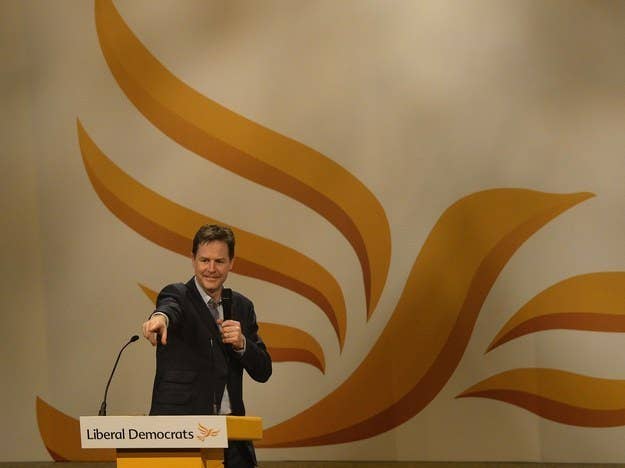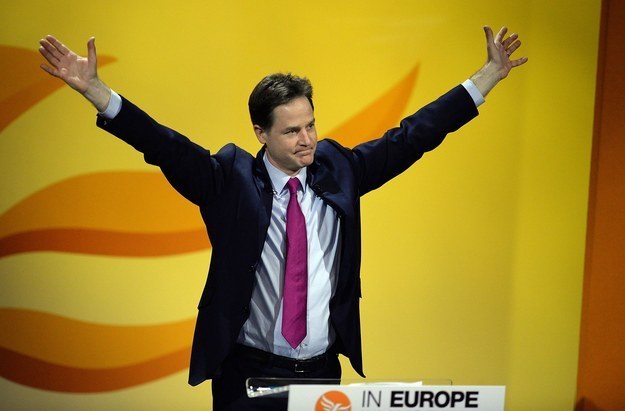
If you voted for the Liberal Democrats at the last election, you probably regret it. But electoral maths mean you also get to decide the next election. This is how four million disaffected liberals have deserted Nick Clegg's party, where they've gone and what the Lib Dems are doing to win back the most important voters in Britain.
The overnight collapse of Lib Dem support is of a "very different magnitude" to anything that's come before, explains political blogger Mike Smithson. According to the latest YouGov poll more than 7 out of 10 people who voted for the party in 2010 say they won't do so next time. That's the equivalent of losing the support of almost five million voters in the space of a couple of years, a collapse without precedent in recent British political history.
Just 32% of people who voted Lib Dem in 2010 say they will vote for the party again: they're now more likely to vote Labour.
Ed Miliband knows this and his political career is entirely dependent on attracting the support of these disaffected liberals. As things stand, Labour is on track to win the next general election. But without the support of disaffected ex-Lib Dems, the Tories would be in the lead.
Indeed, the Lib Dems' collapse in support is so dramatic that if you pick a random person who voted Lib Dem in 2010, they're now more likely to support Labour than Nick Clegg's party. Around two million people – equivalent to 6% of the entire electorate – have made the transition from Lib Dem voter to Labour supporter since the last election. In comparison, it took the Tories 13 years in opposition between 1997 and 2010 to grow their poll lead by just 5.4%.
People who voted Lib Dem in 2010 are twice as likely to stick with the party if it helps keep the Conservatives out of their local constituency.
Not that Labour has done much to attract these disaffected Lib Dems: anger at the coalition's record has done most of the work for them. "I think a lot of it is just reminding people of the huge broken promises of Nick Clegg," Jon Ashworth, Labour's deputy chairman, tells BuzzFeed. "I don't think it needs to be any more sophisticated than that, to be honest, because it's still there on the doorstep."
For many of these voters any association with the Conservatives is toxic, and the Lib Dems' decision to enter coalition with the Tories marks them out as infected.
"Even sharing the same oxygen as a Tory is enough to put off a lot of people who are instinctively opposed," explains Lib Dem party president Tim Farron, who sits on the left-wing on his party, and fancies his chance as a potential future leader. "That's particularly an issue in parts of the north and Scotland."
Farron says the best way for his party to attract these lost voters back from Labour is to remind them of the things they hated about the last Labour government: the environment, civil liberties, ID cards, or the Iraq war.
But he's got a challenge on his hands. Mike Smithson reckons that Ed Miliband has a very special appeal to people who used to be on the left wing of the Liberal Democrats. "He pulls the right strings: the way he was tough taking on the Murdochs, the way he's been absolutely clear on things like the Iraq War, actions on the Syrian intervention last year. All those things very much endear Ed Miliband to this particular group of voters."

The Lib Dem vote share has been in steady decline since the 2010 general election.
Instead, the Lib Dems are hoping to win back former voters by presenting themselves as the "anti-Tory party" in seats where Labour has no chance of winning. But even this will please Miliband, says Peter Kellner, the President of pollster YouGov.
"I'm not terribly sure that Labour wants former Lib Dem voters to stay with them in seats where they couldn't win, because in the order of things it would be better for people in those seats to go back to the Lib Dems," he tells BuzzFeed. "They'd rather have Lib Dems than Tory MPs in places where they have no chance of winning."
This effect could be particularly pronounced in 2015, for an unlikely reason. According to Mike Smithson, focus groups have found that the process of going through the Alternative Vote referendum campaign and learning about the way the existing voting system works has made a substantial part of the electorate more likely to vote tactically.
Other tactics include trying to win back public sector workers, especially teachers, who have deserted the party since 2010. This is one of the main reasons that the Lib Dems have gone on the attack against education secretary Michael Gove.
"The first six to 12 months of this Parliament, Clegg would not dispute anything Cameron said: they needed to make the Coalition work," Kellner explains. "As time has gone by, the Lib Dems have become more and more independent, and more and more willing to take on the Tories."
These are the seats where Lib Dem MPs have small leads over Labour.
Ironically for a party that has always suffered from the UK's refusal to adopt proportional representation, the Liberal Democrats could find their MPs protected by the existing situation. At the last election, the Liberal Democrats found themselves in the perverse situation of losing five MPs despite actually having increased their vote share. At the next election the electoral system could work in their favour, and they could suffer surprisingly few losses even if their vote share drops like a stone across the country.
Casualties will be concentrated in seats where the Liberal Democrats go head-to-head with Labour. David Ward, MP for Bradford East, is probably a goner – if fewer than 200 of his 13,637 voters switch to Labour, he's out of the job. And he's not alone. BuzzFeed understands that at least one Liberal Democrat MP in a highly marginal seat is in the process of lining up a job for after the 2015 election.
Farron, who tells BuzzFeed he's "not a betting man", doesn't seem sure about the Lib Dems' prospects in 2015. Does he think his party can equal their vote share in the 2010 election?
"I don't know," he says. "But I do think that the people who voted for you last time and the people who are most likely to vote for you next time, and we write them off at our peril."
